Vegan Globetrotter is supported by our audience. When you purchase through one of our links, we may earn a small affiliate commission. As an Amazon Associate I earn from qualifying purchases. Your cost is not affected.
==================
Osteoporosis is a condition where our bones become thin and lose their strength. Although more prevalent in women, it can also impact men. Often a silent disease, it is usually diagnosed only when a sudden impact or fall results in a broken bone.
Globally, 1 out of 5 men and 1 out of 3 women aged 50 or older experience a broken bone due to osteoporosis. In addition, 54% of Americans are affected by osteoporosis or low bone mass.
It is essential to know that what you eat impacts your bone health. Thus, taking care of your nutrition is crucial for maintaining bone mass. However, a healthy diet is just one piece of the puzzle. Exercise regularly and avoid certain risk factors to avoid osteoporosis.
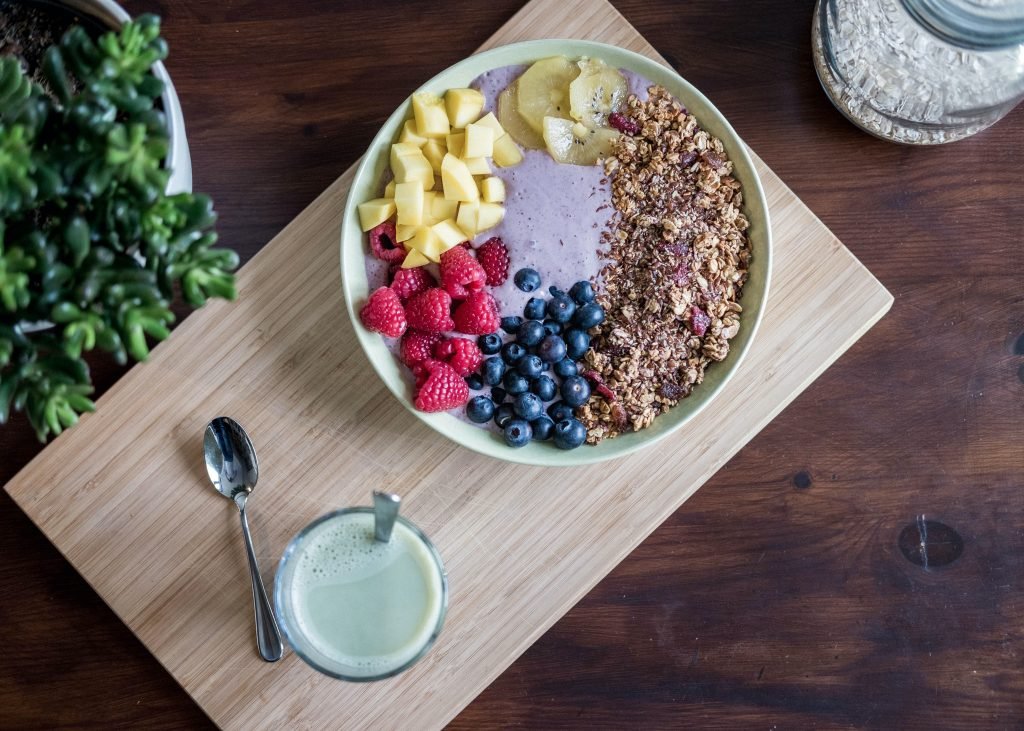
Image Source: Unsplash</s[am>
Poor bone health or low bone mass can cause osteoporosis, increasing the risk of bone fractures. A healthy diet helps you build strong bones early and maintain them throughout your life. Both calcium and vitamin D nutrients are vital for healthy bones. While calcium builds strong bones, vitamin D helps your body to absorb calcium.
In this article, we will see how eating affects our bones. We will learn about a healthy diet for osteoporosis and how it can reduce the risk of osteoporosis. So, let’s explore how our choices at the dining table can pave the way for a healthier, more robust tomorrow.
Diet and Osteoporosis
Our bones are created with protein fibers packed with calcium and other minerals. This structure constantly adjusts to how we live. Throughout our childhood and early adulthood, our bones develop their strength. However, from the mid-30s onward, they start losing calcium, increasing the risk of osteoporosis.
Thus, caring for your bones in your first 30 years is essential. It can help you ensure your bones have adequate calcium and other minerals for the rest of your life.
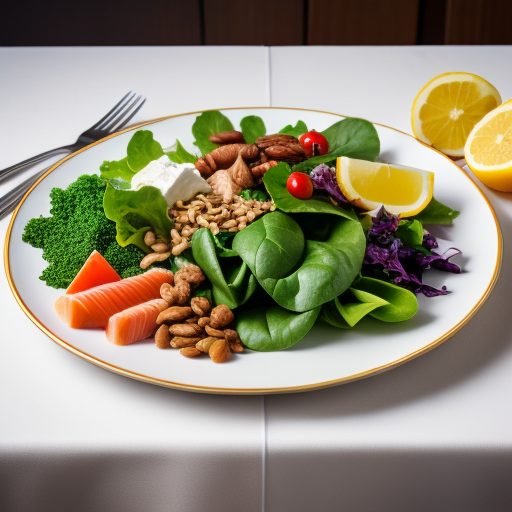
As mentioned earlier, our bones do not remain constant throughout our lives. They break down and rebuild as part of normal bone metabolism. This process involves two primary types of cells — osteoblasts and osteoclasts. Osteoblasts help form new bones, while osteoclasts break down old bones through bone resorption.
However, when the balance of bone metabolism is disrupted, bone mineral density declines. As a result, our bones become weaker, less dense, and more prone to fractures. Eventually, this imbalance leads to low bone mass or osteoporosis diagnosis.
Moreover, several factors, including aging, menopause, and specific medics, can aid bone loss. Luckily, a diet that supports bone health can help reduce the risk of osteoporosis.
In this regard, the osteoporosis diet and a lifestyle that supports bone health are vital. A healthy diet and healthy lifestyle are helpful at any age. Not only does it reduce the risk of osteoporosis, but it can also prevent age-related bone loss.
Healthy Diet for Osteoporosis
Here is how dietary choices influence bone health and the prevention of osteoporosis:

Increase Calcium Intake
- Adequate calcium is vital for building and maintaining bone mineral density.
- Foods rich in calcium, like leafy greens, dairy, and fortified foods, strengthen bones.
Absorb Healthy Vitamin D
- Vitamin D assists in calcium absorption in the body.
- Exposure to sunlight and dietary choices like fatty fish and fortified products aid vitamin D levels.
Embrace a Balanced Diet
- A well-balanced diet with nutrients, including vitamins and minerals, is crucial for overall bone health.
- A mix of fruits, vegetables, lean proteins, and whole grains are the building blocks of strong bones.
Get More Protein
- Protein is a critical component of bone health. It contributes to bone structure and maintenance.
- Add protein sources like meat, fish, dairy, or plant-based options for optimal bone health.
Maintain a Healthy Lifestyle
- Engage in weight-bearing exercises and muscle-strengthening activities. It can help you maintain your bone mineral density.
- Lack of physical activities and sedentary lifestyles can weaken bones.
- Excessive consumption of caffeine, alcohol, and high-sodium foods can trigger bone loss. In addition, it also has adverse effects on calcium absorption.
Creating an Osteoporosis Diet Plan for Healthy Bones
Creating a diet plan for osteoporosis ensures good bone health. It involves incorporating foods rich in calcium, vitamin D, protein, and other nutrients. Here is a simple osteoporosis diet plan to help support bone health:
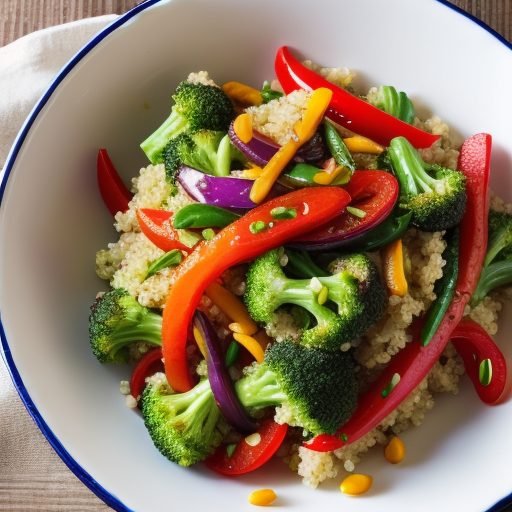
Breakfast for Bone Health
Calcium-Rich Smoothie:
- Greek yogurt, kale or spinach, banana, almond milk.
- You can also include chia seeds or ground flaxseeds for added nutrients.
- Opt for mixed nuts for mid-morning snakes to increase calcium intake and healthy fats. These include almonds, walnuts, and sunflower seeds.
Lunch for Good Bone Health
Salmon Salad
- Grilled salmon on a bed of leafy greens (kale, spinach, arugula).
- Adding tomatoes, broccoli, and avocado gives you extra nutrients.
- Dress with olive oil and lemon for a healthy fat boost.
- If you often take afternoon Snacks, opt for Greek yogurt with berries. A bowl of Greek yogurt with berries (blueberries, strawberries) is rich in calcium and antioxidants.
Dinner Meal Plan for Osteoporosis
Quinoa and Vegetable Stir-Fry
- Stir-fry vegetables like broccoli, bell peppers, and bok choy.
- Add tofu or lean chicken for protein.
- Serve over a bed of quinoa for a complete, nutrient-rich meal.
Super Foods for Osteoporosis and Bone Health
Maintaining optimal bone health is crucial for your overall well-being. Incorporating nutrient-rich foods into your diet is the best way to keep your bones strong. They can significantly support bone health and prevent the risk of osteoporosis. Here are some superfoods known for their bone-boosting properties:
Greek Yogurt: A Delicious Boost for Bone Health
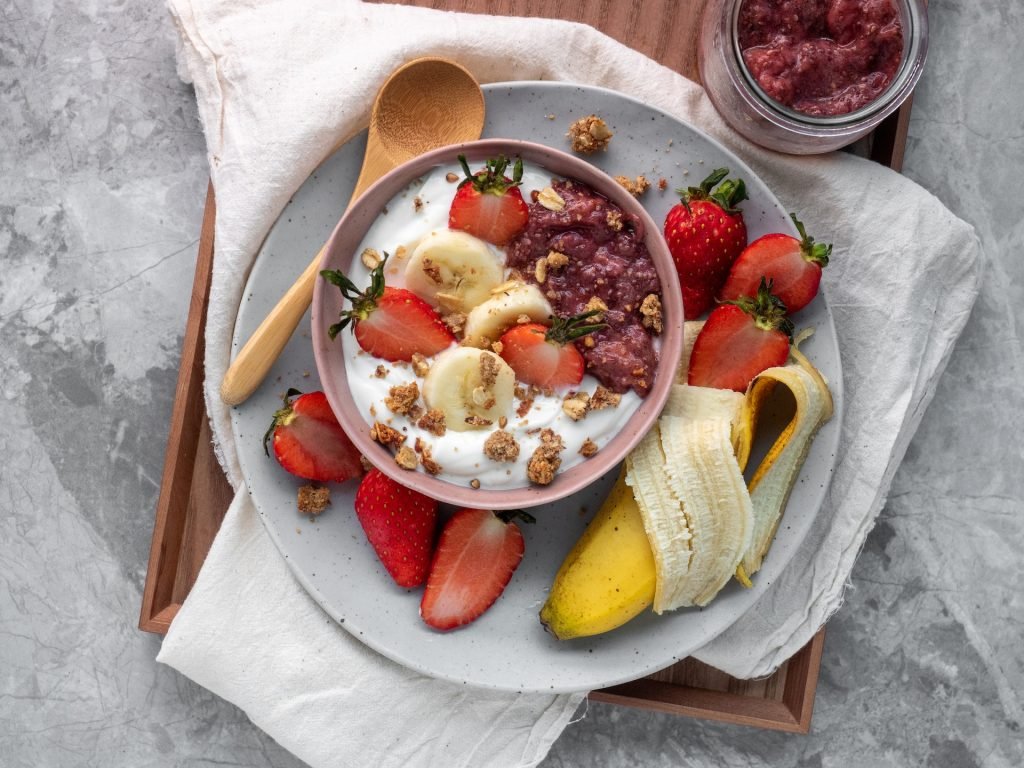
Image Source: Unsplash
Greek yogurt is a nutritional powerhouse for bone health. It is packed with calcium, which is crucial for skeletal strength. Enhancing calcium absorption, Greek yogurt, fortified with vitamin D, prevents the risk of osteoporosis.
Moreover, it is also a rich source of protein, which supports bone structure and repair. The probiotics in Greek yogurt promote a healthy gut, aiding nutrient absorption.
Beyond its health perks, it’s a tasty addition to sweet and savory dishes. Whether in a breakfast parfait or a flavorful recipe, including Greek yogurt in your diet ensures bone health and overall well-being.
Cheese: A Delectable Defender for Strong Bones
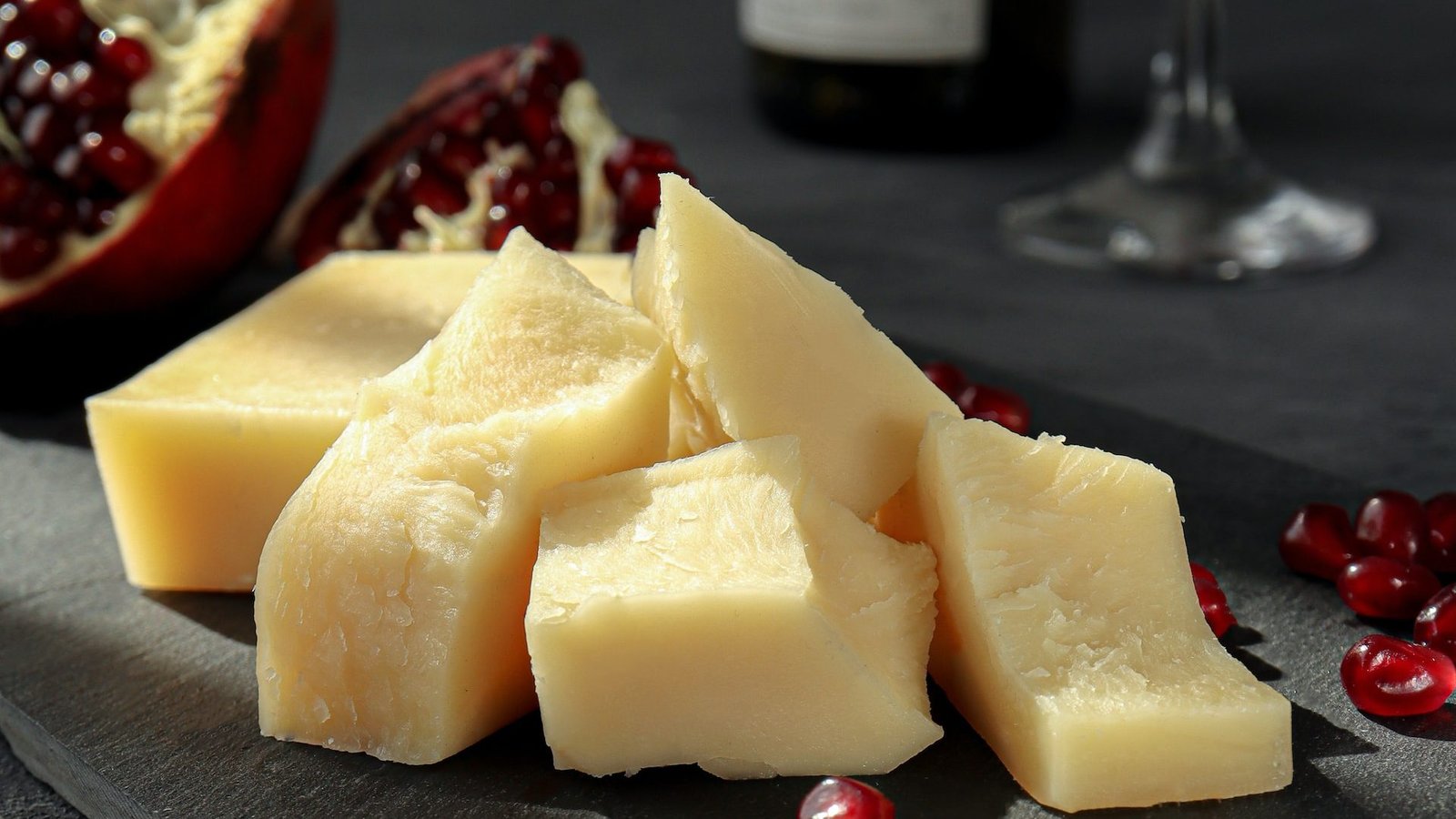
Image Source: Unsplash
Cheese isn’t just delicious but also a mighty defender against osteoporosis. Packed with essential nutrients, it is a prime player in supporting bone health.
Calcium in cheese boosts bone mineral density, preventing the risk of osteoporosis. In addition, the phosphorus it has enhances bone strength and mineralization.
As a protein powerhouse, it has amino acids vital for building and repairing bone tissue. Some varieties, like Swiss and mozzarella, even deliver a dose of bone-loving vitamin B12.
Moreover, you can enjoy cheese in diverse dishes as it adds flavor and nutritional value to your diet. However, remember that moderation is vital due to its calorie and fat content.
Leafy Greens
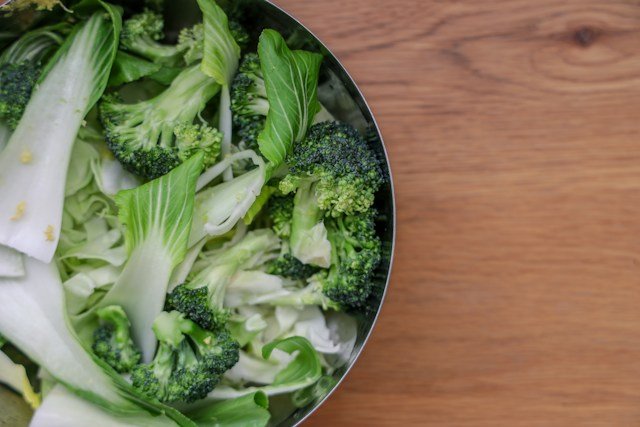
Image Source: Unsplash
Leafy greens are your best companions when it comes to bone health. They are particularly beneficial if you want to prevent or manage osteoporosis.
Adequate calcium intake keeps bones healthy. While you can find it in dairy foods, it is also in dark green leafy vegetables. A few rich sources are bok choy, Chinese cabbage, kale, collard greens, and turnip greens.
For example, one cup of cooked turnip greens offers around 200 mg of calcium, covering 20% of your daily target. In addition, these greens bring vitamin K to the party, lowering the risk of osteoporosis.
So, why not have the best of both worlds? Enjoy some dairy and load up on these leafy greens to give your bones the necessary calcium intake.
Fatty Fish: A Tasty Way to Stronger, Healthier Skeletons
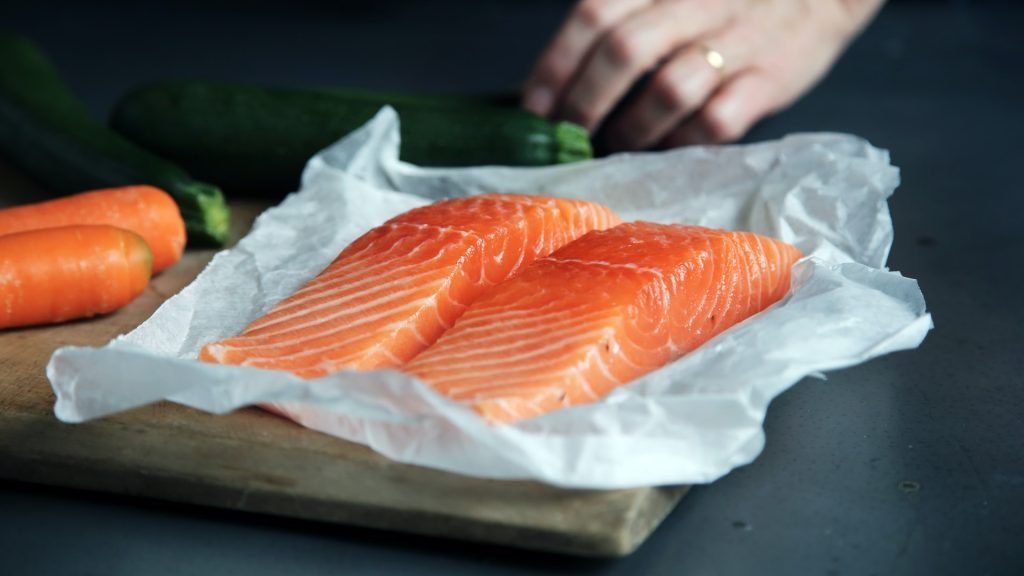
Image Source: Unsplash
Fatty fish helps you maintain bone health, especially for osteoporosis patients. Varieties like salmon, mackerel, and sardines bring a wealth of nutrients.
They have omega-3 fatty acids, known for heart health and calcium absorption ability. In addition, fatty fish are a natural source of vitamin D, a key player in calcium utilization. Vitamin D ensures that your calcium intake is deposited in your bones to bolster their strength.
Moreover, the high-quality protein content in fish is critical for bone tissue, aiding in repair and maintenance.
Furthermore, these fish often contain essential minerals, including phosphorus. They work hand in hand with calcium to fortify bones. Thus, adding grilled salmon or mackerel tacos to your osteoporosis diet is a delicious way to enjoy these bone-boosting benefits.
Figs: A Calcium-Packed Fruit
A healthy diet for osteoporosis should also include fruits that support bone health. Figs, for example, are a go-to option. Five medium fresh figs offer about 90 milligrams of calcium.
Moreover, these fruits also deliver other essential bone-friendly nutrients, including potassium and magnesium. Fresh figs are abundant during the summer and fall. However, do not worry if it’s not the season—dried figs are available year-round and pack a punch, too.
Half a cup of dried figs boasts a whopping 121 milligrams of calcium. It means whether fresh or dried, figs make a nutritious and delicious addition to your diet.
Berry Boost for Bones
Adding berries to your osteoporosis diet is a refreshing and nutritious way to support overall bone health. Beyond their delightful taste, berries contribute significantly to maintaining bone strength and resilience.
Led by strawberries, they excel in fortifying bone health. These fruits brim with vitamin C, a collagen formation maestro vital for bone structure. Vitamin C boosts collagen synthesis, maintaining the integrity of your bone structure.
Whether as a snack, in smoothies, or yogurt, these colorful gems support strong, healthy bones in your lifestyle.
Nuts and Seeds: Nutrient-Packed Delights
Nuts and seeds are a healthy diet for osteoporosis and an intelligent move for boosting bone health. These crunchy delights offer a powerhouse of essential nutrients.
Rich in calcium, nuts like almonds and seeds like chia and sesame improve bone density. In addition, they have magnesium, phosphorus, and vitamin K, essential for bone metabolism.
Moreover, Omega-3 fatty acids in certain seeds, like flaxseeds, further enhance bone health. Snack on a handful of your favorite mixed nuts or sprinkle seeds on salads and yogurt to infuse your diet with these bone-loving nutrients.
With various options, nuts and seeds add flavor and nutritional value to support bone health.
Foods to Avoid with Osteoporosis

Maintaining bone health involves choosing the right foods and being mindful of what to limit in your diet. Here are some specific foods that may negatively affect your bone health.
High-Sodium Foods
Sodium is a vital nutrient for bodily functions. However, excessive sodium intake can lead to adverse health effects, including bone health. High sodium boosts calcium loss through urine, lowering bone density. This calcium imbalance leads to osteoporosis, making your bones weak and porous.
Thus, balancing sodium intake is vital since a diet heavy in processed and salty foods can worsen the issue. Add more veggies, fruits, nuts, and whole grains to your diet to reduce excessive sodium intake. This approach can help you ensure your well-being and lower the risk of osteoporosis.
Processed Meats
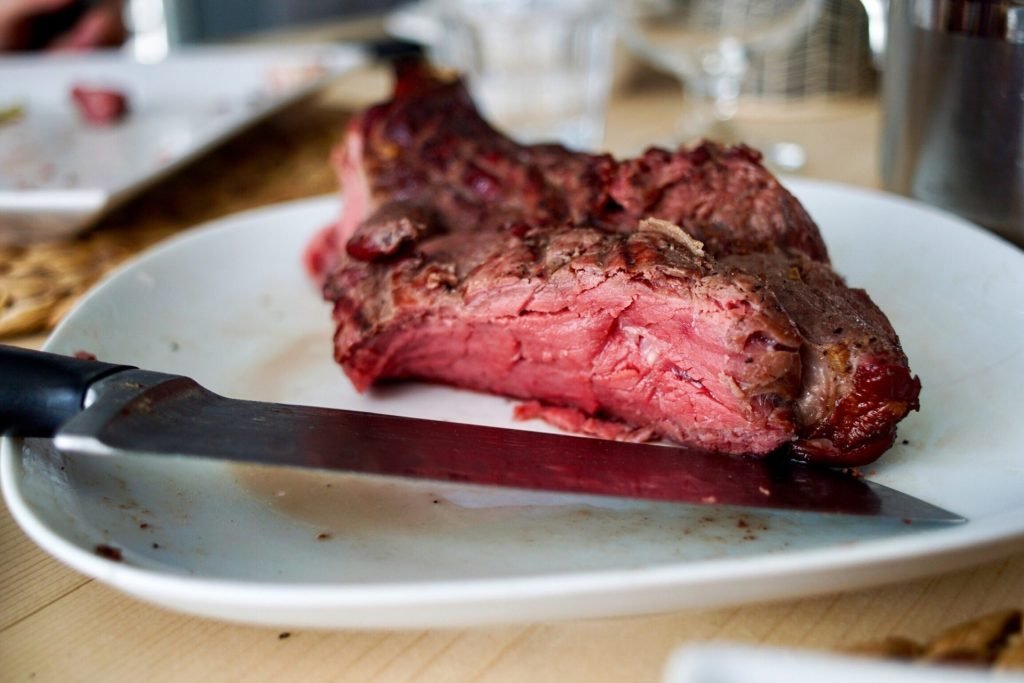
Image Source: Unsplash
For those with osteoporosis, dietary fat is crucial. Low-fat and high-fat diets increase the risk of osteoporosis. That is why embracing a moderate-fat diet is essential to support bone density. Remember that red meat, like beef, pork, and lamb, is high in saturated fat and omega-6 fatty acids.
Studies suggest more of these fats may link to a higher risk of osteoporotic fractures. Common red meat forms include ground beef, hamburgers, and processed options like hot dogs and bacon.
Avoiding or reducing red and processed meat intake is essential for osteoporosis management. This way, they can better support their bone health and overall well-being.
Watch Out for Too Much Sugar
Excessive intake of added sugar has a plethora of health risks, including bone health. Overeating added sugar is unsuitable for your health, especially for your bones. Studies state that drinking sugary beverages, like soda, can lead to a decline in bone quality.
Moreover, remember that there is a difference between natural and added sugars. Natural sugars in foods like fruits and veggies benefit your health. However, added sugars found in ultra-processed foods pose many health risks. These include baked goods, desserts, energy drinks, soda, sweetened teas, and coffees.
Coffee Benas and Chocolate Alert
Caffeine is a natural energy booster in coffee beans, chocolate, and teas. However, excluding it from your osteoporosis diet is wise if you have bone issues.
While some research suggests that a small amount of caffeine may benefit bones, too much could mess with bone metabolism. It might even take away calcium from your bones.
Thus, it is better to stay away from caffeinated drinks. Instead, opt for decaffeinated coffee, tea, or drinks without caffeine, like water or seltzer water. That way, you can keep your bones in good shape.
Skip Alcohol to Keep Your Bones Healthy
If you are dealing with osteoporosis, it is wise to skip alcohol since it messes with your bone health. Overdoing the drinking blocks bone-loving nutrients like magnesium, vitamin D, and calcium absorption.
Moreover, alcohol likes to mess up with hormones crucial for bone strength. Thus, give alcohol the nod to keep your bones on the right track. Your bones will thank you for ditching alcohol and the interference it brings.
Wrapping Up
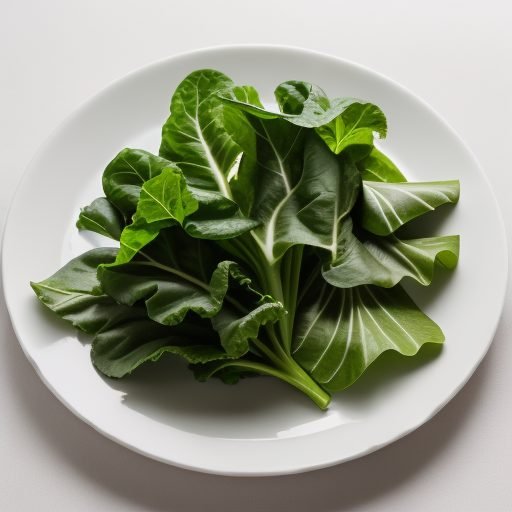
Prioritizing a healthy diet for osteoporosis is essential for robust bone health. Knowing what is good for osteoporosis is the first step. Incorporate foods that offer protein and calcium essential for bone health. In addition, exercise regularly and indulge in muscle-strengthening activities. It helps you keep your bones strong and improves your overall health.
Moreover, avoiding foods with adverse impacts on bones is also critical. Remember that what we eat also impacts our bone quality. So, avoid processed foods, high-sodium products, and caffeinated drinks.
FAQs
Should I include eggs in my osteoporosis diet?
Of course, adding eggs to your osteoporosis diet is a good idea. Egg yolks have enough vitamin D, also known as the “sunshine” vitamin, which is crucial for your bones. It helps produce a calcium-binding protein, helping your body with calcium absorption. This process, in turn, keeps bone healthy, a critical consideration for individuals managing osteoporosis.
What is the best diet plan for osteoporosis?
The best diet plan for osteoporosis has foods with calcium and vitamin D. These are critical for healthy bone formation. Add dairy products, leafy greens, fortified cereals, and fatty fish to your diet. In addition, protein, magnesium, and vitamin K intake are also essential for healthy bones. You can consult with your doctor or a registered dietitian for personalized advice. They can help you with your osteoporosis diet plan based on your needs.
What foods give you the most calcium and vitamin D?
Plenty of excellent sources of calcium and vitamin D. Similarly, fatty fish like salmon and fortified foods like orange juice and cereals have vitamin D. For example, dairy products like milk, cheese, and yogurt are calcium-rich. Leafy greens like kale and broccoli also have calcium. Including these in your osteoporosis diet helps support bone health. Moreover, spending time in the sun is a natural vitamin D source.
What is a negative calcium balance?
A negative calcium balance is when the body loses more calcium than it absorbs. Factors like dietary intake, absorption, and excretion influence calcium balance. When you have a negative calcium balance, your body loses more calcium than it is getting. It can make your bones weaker and increase the chances of getting osteoporosis.
What type of diet for osteoporosis increases bone mass?
The best diet for osteoporosis aids strong bone formation. If you want to increase bone mass, your diet should include foods that offer calcium and vitamin D. These include fortified foods, dairy products, and leafy greens. Moreover, weight-bearing exercises can also help increase bone mass. Regular physical activity and a nutrient-rich diet have a positive impact on bones. It also reduces the risk of bone-related issues like osteoporosis.
Are wheat brans included in a healthy diet for osteoporosis?
Wheat bran and beans have something in common – both have phytates. Phytates can stop your body from soaking up calcium. However, only 100% wheat bran affects how our bodies absorb calcium from other foods simultaneously. It means you can add wheat bran to a healthy diet for osteoporosis. So, for a bone-healthy diet, mix it up. Don’t stick to wheat bran only; include other calcium-rich foods. While wheat bran has an impact, various foods contribute to bone health. If you are planning for strong bones, balance is critical. Talk to a healthcare pro or a dietitian for personalized advice. They’re experts in keeping your bones in top shape.
Welcome to Senior Parents!
Unlock the secrets to graceful aging and empower your senior parenting journey! Explore many tips, insightful guides, and the latest updates on navigating age-related issues. We are your go-to destination for valuable information and support.
Join our community of caregivers, share in the wisdom, and make the golden years truly golden!
Follow us on social media for the freshest insights. Together, let’s embrace and enhance the journey of senior parenting!
Facebook: www.facebook.com/sr.parents
Insta: www.instagram.com/seniorparents/
Pinterest: www.pinterest.com/seniorparents/
Twitter: twitter.com/senior_parents



Don't miss out
when new recipes and information are added!
Join our newsletter for free recipes,
healthy living inspiration, and special offers
You have Successfully Subscribed!